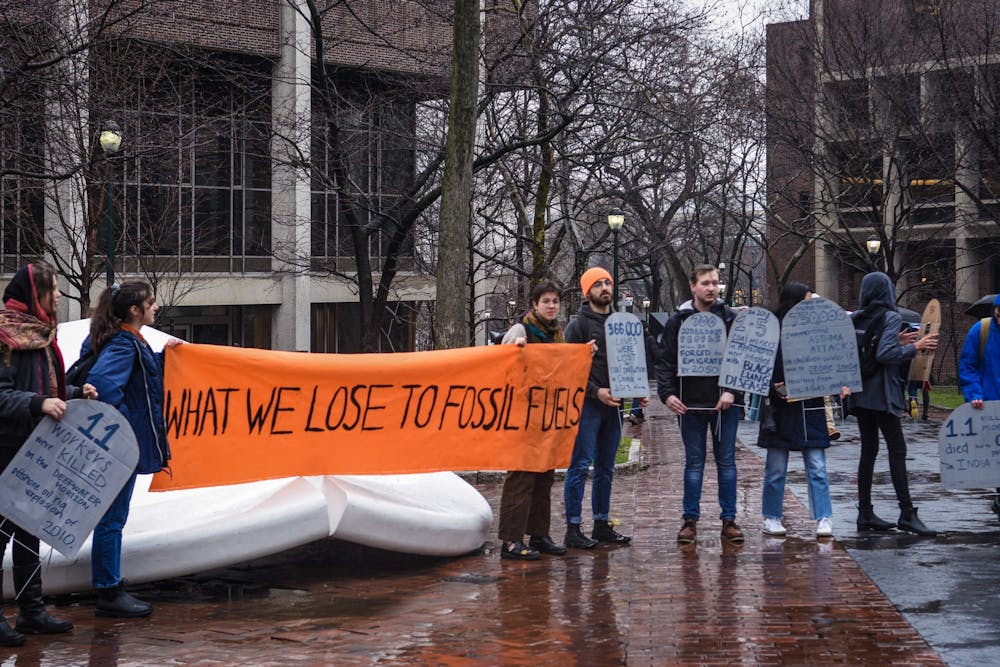Penn will halt commitments to private equity vehicles dedicated to investments in fossil fuel production, an update to its existing practice of not making direct investments in companies engaged in the production of fossil fuels.
Top University administrators announced the move in an email to the Penn community late last week, eliciting mixed reactions from student climate organizations who argue that the policy does not go far enough to divest from fossil fuels and reduce the University's impact on the climate.
Administrators cited the United Nations Intergovernmental Panel on Climate Change's August report, which warns that many of climate change's impacts are now irreversible, as a primary reason for the policy change.
Penn administrators also reiterated their plan to achieve net-zero greenhouse gas emissions across the endowment by 2050, adding that new investments have been made to support the transition to a low-carbon economy. The email added that the University is continuing last spring’s Climate and Sustainability Action Plan 3.0, which calls for the University to achieve 100% carbon neutrality by 2042.
In addition to its fossil fuel investment update, the University also announced a new President’s Sustainability Prize, which will award up to $100,000 for a winning sustainability project.
Campus groups including Fossil Free Penn, however, maintain that the University has yet to fully divest from fossil fuels despite the policy change.
“It's not a divestment in any sense. The University can still invest in fossil fuels via mixed funds, which is how they generally allocate their investments,” Engineering senior and FFP coordinator Ari Bortman said. “This verbiage, clearly, intentionally leaves the door open for the University to continue to invest in fossil fuels."
College senior and FFP coordinator Katie Collier agreed, adding that Penn "can't really put the fire out if they're the ones creating it."
‘Warming is human activity’: Penn experts urge climate action on campus and beyond
Penn faculty call for bolder University climate action and fossil fuel divestment
Members of Student Sustainability Association at Penn, an umbrella group representing 13 environmental student groups on campus, agree that Penn's plan stops short of complete divestment.
“We want them to not allow their money that is sent to some sort of financial middleman to go to fossil fuels,” College senior and SSAP Co-Chair Vyshnavi Kosigishroff said. “And so it's for that reason that we're more confidently calling this partial divestment.”
Both SSAP and Fossil Free Penn members said that the email does not move the University’s pre-existing funds away from fossil fuel production. SSAP has estimated, with the help of faculty and professionals, that about 1% of the University's endowment is invested in fossil fuels, Kosigishroff said. FFP has separately estimated that around $922 million of the endowment finances fossil fuel production, based on the percentage of the endowment invested in natural resources, according to FFP coordinators.
“If anything, it creates an illusion,” College senior and FFP coordinator Maeve Masterson said, critiquing the complex writing style of the email. "That actually does a disservice to most of the Penn community who are now reading this and are completely misled, and it delays real progress.”
Penn also announced plans to allocate $60 million to recruit at least 10 top faculty in Energy and the Environment, as well as build facilities to encourage academic research that matches the need for sustainable energy. SSAP representatives, however, criticized the plan as a surface-level move without full divestment.
“There are a lot of tertiary ... benefits that will come to Penn from doing all this climate stuff on an academic level,” Kosigishroff said. “But without divestment, you run into another prop, another fallacy, where you're going to hire the best energy professionals in the world to teach classes, while going directly against what these energy professionals are saying to do."









